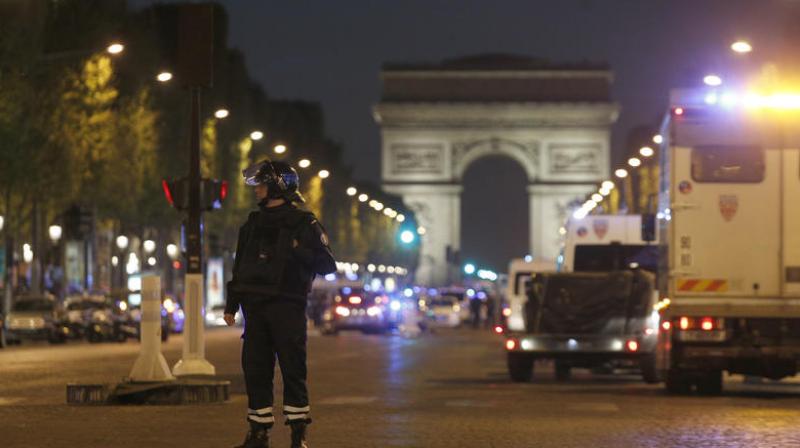Fears engulf French election after policeman shot in Paris

Paris: The killing of a policeman on Paris's Champs Elysees claimed by the Islamic State group rocked France's presidential race Friday with just two days to go before one of the closest races in recent memory.
Bloodshed had long been feared ahead of Sunday's first round of voting after a string of jihadist atrocities since 2015, and shooting on the world-renowned boulevard forced security to the top of the agenda in the campaign.
Three of the four frontrunners -- far-right leader Marine Le Pen, centrist Emmanuel Macron and conservative Francois Fillon -- called off campaign events planned for Friday in the wake of the attack.
Le Pen, widely seen as taking the hardest line on security, called for France to "immediately" take back control of its own borders from the European Union and deport all foreigners on a terror watchlist.
"This war against us is ceaseless and merciless," she said in a sternly worded address, blasting the "monstrous totalitarian ideology" behind Thursday night's attack by a 39-year-old Frenchman known for his links to jihadists.
Macron, a 39-year-old moderate whom other candidates have portrayed as too inexperienced to protect France against the terror threat, warned against any attempts to use the attack for political gain.
"I think we must one and all have a spirit of responsibility at this extreme time and not give in to panic and not allow it to be exploited, which some might try to do," he told French radio.
The gunman opened fire with an automatic weapon on a police van at around 9:00 pm (1900 GMT) on Thursday, sending tourists and visitors running for their lives.
After killing the officer and injuring two of his colleagues just a few hundred metres from the Arc de Triomphe, the gunman was shot dead in return fire while trying to flee on foot.
A statement by IS's propaganda agency Amaq said the attacker was one of its "fighters", identifying him as "Abu Yussef the Belgian".
But French authorities said the perpetrator was a 39-year-old Frenchman living in the Paris suburbs, whose name they did not release.
The IS claim raised initial concerns that a possible second attacker could be on the loose.
On Friday, French authorities said a suspect sought by Belgium police, who was suspected of having planned to travel to France on Thursday, had handed himself in at a police station in the Belgian city of Antwerp.
French interior ministry spokesman Pierre-Henry Brandet said it was "too early to say" if the man was linked to Thursday night's shooting.
During a search of his home, Belgian police found weapons, balaclavas and a train ticket for France leaving Thursday morning.
The killer identified by French authorities was known to anti-terror police, sources said. He had been arrested in February on suspicion of plotting to kill police officers but released because of lack of evidence.
He had been convicted in 2005 of three counts of attempted murder, with two of these against police officers, sources said. Three people from his entourage were being questioned by police.
The impact on the election is unclear. Until now, surveys showed voters more concerned about unemployment and the economy than terrorism or security, though analysts warned this could change in the event of violence.
Two radicalised men were arrested in the southern city of Marseille on Tuesday and authorities believe they had been trying to launch an "imminent" attack on the campaign.
Macron and Le Pen had long led the presidential campaign but it has tightened in recent weeks and polls indicate that any two of the four frontrunners, including hard-left contender Jean-Luc Melenchon, could reach the second round on May 7.
Thursday's deadly attack, the first in France since a priest was killed last July, comes after a series of attacks in Europe in the last month, targeting a Stockholm department store, the British parliament in London and the underground train system in Saint Petersburg.
As the first details of the attack filtered through, US President Donald Trump said that "it looks like another terrorist attack. What can you say? It just never ends".
Shop owners and restaurant managers on the bustling Champs Elysees, in the heart of Paris, described the chaotic scenes that followed the attack.
"We had to hide our customers in the basement," said Choukri Chouanine, manager of a restaurant near the site of the shooting, adding there was "lots of gunfire".
A foreign tourist was slightly wounded during the shooting. France has been under a state of emergency for nearly a year and a half, with more than 230 people killed in jihadist attacks since the start of 2015.
The offices of Charlie Hebdo magazine were hit in January 2015, IS gunmen and suicide bombers killed 130 people at sites around Paris in November that year, and a Tunisian man rammed a truck through crowds in Nice in July 2016, killing 86 people.

